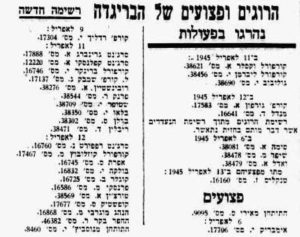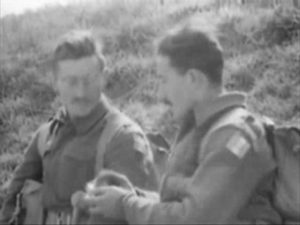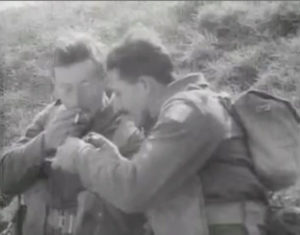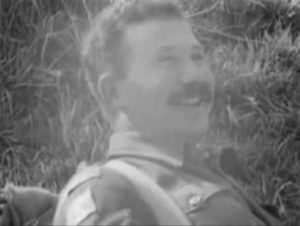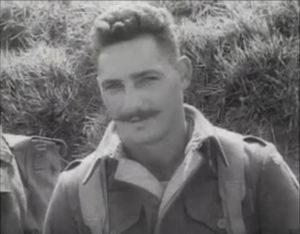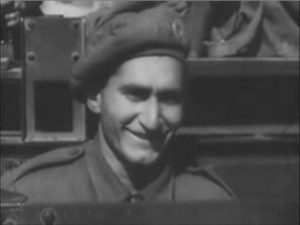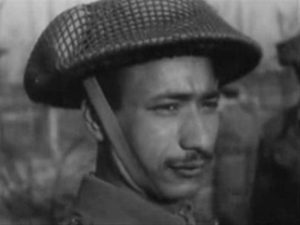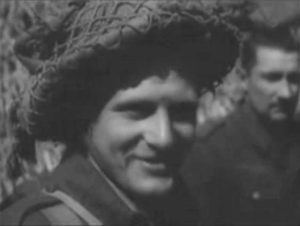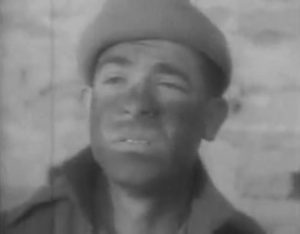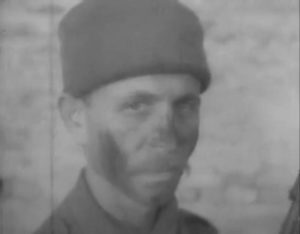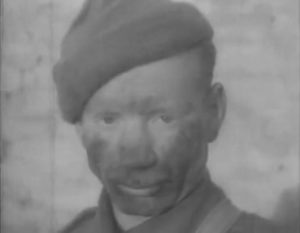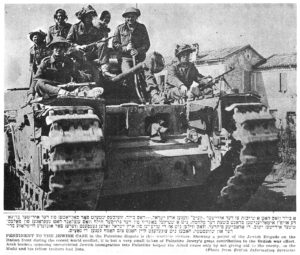There are stories, and then, memories within stories, and finally, names within memories.
Several of my recent posts have presented brief accounts of the history of the Jewish Brigade – during battle, and, shortly after the war’s end – as published in the German Exile Newspaper Aufbau (for example, here, here, and here), The Palestine Post, and earlier, in the British military newspaper Parade. (More, I hope, to follow!) While these accounts are windows upon the military history of the Brigade, and shed moving light on encounters of Jewish soldiers from the Yishuv with survivors of the Shoah, European civilians, and German prisoners of war, by nature such stories largely render the identities of soldiers as abstractions, only giving brief glimpses of their thoughts and life stories, yet very rarely touching upon their individual identities – at best. Well, such is often the nature of history.
So, to more fully honor and commemorate the Jewish Infantry Brigade Group, this post presents the names of the thirty-seven Brigade soldiers who fell in battle, based on information in a variety of print and digital sources. Such as…
The Book of The Jewish Brigade: The History of the Jewish Brigade Fighting and Rescuing [in] the Diaspora (גולהה קורות החטיבה היהודית הלוחמת והמצילה אתספר הבריגדה היהודית), by Jacob Lifshitz. This 1950 hardcover book largely comprises brief biographies and photographs of fallen Brigade soldiers. To the best of my knowledge, this book, neither a history of the Brigade in terms of its ideological and political origins, nor a chronicle of its military engagements, I think remains untranslated, and probably the main, if not only, monograph about these men in terms of their life histories as individuals.
We Will Remember Them – A Record of the Jews Who Died in the Armed Forces of the Crown 1939 – 1945, published in 1989, with a second supplementary volume released in 1994. A magnificent and invaluable effort by Henry Morris, the organization of these two books somewhat parallels the design of the 1947 publication American Jews in World War Two, being a comprehensive list of servicemen’s names alphabetically arranged (under branch of service), with entries comprising each man’s rank, major branch of service, military awards, place of residence, and date of death.
Otherwise, I know of no other single English-language work – whether monograph or journal article – in which the names of and biographical information about these men can be found.
So, I hope the list of names below – comprising nominal biographical and bibliographical information about these fallen soldiers – contributes to the historical record about the Brigade.
As such, this list represents a composite of information derived from the website of the Commonwealth War Graves Commission, Henry Morris’ two above-mentioned books, and issues (digital issues, of course!) of Haaretz, The Palestine Post, and other Yishuv newspapers, the latter available via the National Library of Israel, and to a very limited extent (for this post), the The Commemoration Site of Fallen Defense and Security Forces of Israel. Some information also derives from The Jewish Chronicle, which was accessed – amidst the “world” that existed before the COVID Coup of 2020 – via 35mm microfilm at the New York Public Library.
Lifshitz’s book containing a wealth of biographical information about all the fallen of the Brigade, I’ve thus far translated four of the profiles within it (for Gamble, Goldring, Koslovitz / Kozlowicz, and Zilberger) so I’m only including – for reference – the page numbers where relevant biographies and photos for each soldier can be found within that book.
“Stepping back”, how did I put this list together?
I searched the Commonwealth War Graves Commission (CWGC) database – using Henry Morris’ two books as primary references – for records for every man listed in his chapter “The Palestinian Volunteers”. Then, I searched the CWGC database using the search string “Palestine Regiment”. The names and records obtained thus covered soldiers who fell in combat during the Brigade’s military operations in Italy, from March of 1945 through the war’s end, let alone many, many other men (and several women) from the Yishuv (and beyond) whose names don’t appear in this post.
Being that all (I think all?) CWGC records for military personnel include soldier’s serial numbers – in the case of soldiers from the Yishuv, the serial number typically comprising the prefix “PAL/” followed by a string of digits (e.g. “PAL/16323”) – the next step involved searching the National Library of Israel’s website to find relevant wartime issues of Yishuv newspapers in which the soldier’s name appeared: In English in the Palestine Post, and, in Hebrew in Haaretz and other newspapers.
So. Biographical records of varied depth appear below, the record for each man following a format I established in prior posts at this blog. As such:
Soldier’s surname, first name, rank, and serial number
Military awards. (Two of the fallen Brigade soldiers – Eliyahu Herschkovits / Hershkovitz, and, Moshek Josif Zilberberg – received military awards.)
Specific battalion within the Jewish Brigade (if known)
Date on which the soldier was killed in action. (Mattathiahu Koslovitz / Kozlowicz was wounded on 4/12/45 and passed awayon May 22 of the same year.)
Soldier’s date and place of birth
Soldier’s next of kin, and their place of residence
Soldier’s place of burial
Sources of information about the soldier, with name and date of relevant newspaper, followed by page number in Henry Morris’ books.
(Finally, comments about variations in spelling of a man’s name.)
Note that for a number of the records, no English-language information is available concerning the soldier’s year of birth, next of kin, or place of residence. This information might … I think … in some cases … maybe … perhaps? … be in The Book of The Jewish Brigade.
Of the thirty-seven names below, five appeared in The Jewish Chronicle: WO 2C / Company Sergeant Major Eliyahu Herschkovits / Hershkovitz; Cpl. Chaim Kurtzrock; Pvt. Baruch Lewin; Sgt. Yitzchak Rizhi; and Pvt. Aryeh Shechter. Though Lieutenant David Anthony Van Gelder was not specifically a member of the Brigade, appearing in the CWGC database under “The Buffs (Royal East Kent Regiment)”, Lifshitz’s book does include his portrait and biography, while he is listed under “The Palestinian Volunteers” in Henry Morris’ book, and, he was killed while serving with the Brigade. Likewise, the name of WO 2C John Alan Gamble, a Christian soldier serving with the Brigade, appears in both Lifschitz’s and Morris’ books, and will figure in – I hope! – a future blog post covering Jewish military casualties of the 17th of April, 1945. (“Stay tuned.”) In addition, information about Corporal Yoseph Lieberman is absent from Lifshitz’s book.
And so, the names.
Oh, I almost forgot: First, a poem by Zelda Schneurson Mishkovsky.
Every Man Has a Name
זלדה שניאורסון-מישקובסקי
Зельда Шнеерсон-Мишковски
Every man has a name
Given him by God
And given by his father and his mother
Every man has a name
Given him by his stature and his way of smiling,
And given him by his clothes.
Every man has a name
Given him by the mountains
And given him by his walls
Every man has a name
Given him by the planets
And given him by his neighbors
Every man has a name
Given him by his sins
And given him by his longing
Every man has a name given him by those who hate him
And given him by his love
Every man has a name
Given him by his holidays
And given him by his handiwork
Every man has a name
Given him by the seasons of the year
And given him by his blindness
Every man has a name
Given him by the sea
And given him
By his death.
– .ת. נ. צ. ב. ה –
________________________________________
____________________________________________________________
________________________________________
Botnik, Yaakov (יעקב בוטניק), Pvt., 38562
2nd Battalion
3/20/45
Ravenna War Cemetery, Piangipane, Ravenna, Italy – IV,A,5
Haaretz 4/1/45, 4/5/45; Palestine Post 4/2/45; Lifshitz – 244-245; We Will Remember Them I – 68, 239
(CWGC as “Butnik, Yaacov”; Palestine Post as “Botnik, Jacob”; We Will Remember Them as “Botnik, Yaakov”)
Brodt, C. (חיים ברודט), L/Cpl. 38528
3rd Battalion
3/20/45
Ravenna War Cemetery, Piangipane, Ravenna, Italy – IV,A,3
Haaretz 4/1/45, 4/5/45; Palestine Post 4/2/45; Lifshitz – 246-247; We Will Remember Them I – 66
(Palestine Post as “Brod, Chaim”)
____________________
“FROST, WITH A GESTURE STAYS THE WAVES THAT DANCE.”
Gamble, John Alan (ג’ון-אלן גמבל), WO 2C (Battery Sergeant Major), 938393, Royal Artillery
200th Field Regiment
4/17/45
Born 1918
Mrs. Joan Gamble (wife), Kingsbury, Middlesex, England
Mr. and Mrs. Graham and Caroline Susan Gamble (parents)
Forli War Cemetery, Vecchiazzano, Forli, Italy – VI,C,23
Lifshitz – 249-250; We Will Remember Them I – 244
(We Will Remember Them lists name as “Gambel, John Alan”)

(Photo from The Book of the Jewish Brigade, p. 249)
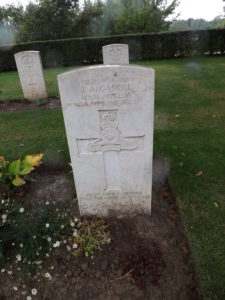
(Photo by FindAGrave researcher bbmir)
John Alan Gamble (ג’ון-אלן גמבל) 938393
(See also this…)
(This is transcribed and translated text from The Book of The Jewish Brigade…)
סרגינט מיגיור גאמבל ג’ון אלאן ז”ל.
נפצע ומת מפצעיו ביום 17 באפריל 1945 בתאונת-דרכים באיטליה.
סוללת התותחנים שלו נסעה לחזית ,וג’ון ,שרכב על אופנוע ,שימש כמפקח-התנועה. מכוניות השיירה העלו גלי אבק גדולים לאורך הדרך ,שסינוורו את העינים והאופנוע שלו התנגש עם מכונית-משא גדולה והוא נפצע קשה בברכיו ובשוקיו ומת מפצעיו .נקבר בבית-הקברות הצבאי (Forli) בעיר פורלי.
בן כ”ז במותו .נוצרי יליד אנגליה .נתחנד בבית-ספר ברונט שבמאנספילד .ספורטאי נלהב ,ייצג את בית-ספרו בתחרויות קרירט וכדור רגל והיה חבר פעיל במשד כמה בקלוב חובבי הקריקמ בוודהאוז ;שחייו וצולל מובהק .עסק לפני התגייסותו בהנהלת-חשבונות .גשוי .התגייס לצבא עם פרוץ המלחמה וצורף לחיל התותחנים .עד שנת 1943 שימש כמדריך בשיעורי-תותחנות בדרום וולס ובאירלנד ,אחר כך נשלח לצפון-אפריקה ושירת במחנה השמיני .אתר עבר לאיטליה והצמיין באומץ-לב בפעולות בפיזה וזבה על בך באות-ההצטיינות “עלי אשל” ביום 24 באוגוסט 1944 .ושוב הצטיין באומץ-לב זוכה להיוכר בהודעה צבאית ביום 11 בינואר 1945 .כשהחי”ל נכנס לחזית ,צורף אלאן לחיל התותחנים שבחי”ל.
Sergeant Major John Allan Gamble of blessed memory.
He was injured in a car accident in Italy on April 17, 1945 and died of his injuries.
His artillery battery drove to the front, and John, riding a motorcycle, served as traffic inspector. The convoy cars raised large waves of dust along the road, which dazzled his eyes and his motorcycle collided with a large truck and he was badly injured in his knees and calves and died of his wounds. He was buried in the military cemetery in the town of Forli.
He was 27 years old at the time of his death. A Christian born in England. He became an enthusiastic athlete at the Brunt School in Mansfield. He joined the army when the war broke out and joined the artillery. Until 1943 he served as an artillery instructor in South Wales and Ireland, then was sent to North Africa and served in the camp “Ali Eshel” on August 24, 1944. And again he excelled in courage. He was recognized in a military announcement on January 11, 1945.
____________________
Gilinskas, Gershon Y. (יצחק-גרשון גילינסקי), Pvt., PAL/38500
1st Battalion
Died of wounds 4/13/45
Forli War Cemetery, Vecchiazzano, Forli, Italy – VI,C,19
Haaretz 5/4/45; Palestine Post 5/6/45; Lifshitz – 256-257; We Will Remember Them I – 244; Gelber, 1984 – 320
(CWGC as “Gilinskas, I.G.”; Palestine Post as “Gilinskas, I.”; We Will Remember Them as “Gilinks, Gershon Y”)
Goldbov, Yehuda (משה גולומב גולוב), Pvt., PAL/38690
4/11/45
Ravenna War Cemetery, Piangipane, Ravenna, Italy – IV,C,8
Haaretz 5/15/45; Palestine Post 5/15/45; Lifshitz – 250-251; We Will Remember Them I – 245
(CWGC as “Golobov, Yehuda”; Palestine Post as “Golobov, Y.”; We Will Remember Them as “Goldbov, Yehuda”)
____________________
Goldring, Uszer (אשר גולדרינג), Pvt., PAL/16323
Missing in Action 3/31/45; Presumably captured; Body never recovered; (Murdered while prisoner of war?)
Born 1910
Mrs. Chana Goldring (wife), Raanana, Israel
Mr. and Mrs. David and Sara Goldring (parents)
Cassino Memorial, Cassino, Frosinone, Italy – Panel 13
Haaretz 4/27/45; Palestine Post 4/13/45, 4/27/45; Lifshitz – 253-254; We Will Remember Them I – 244
(Palestine Post as “Goldyring, U.”; We Will Remember Them I – 244, as “Goldring, Asher”)
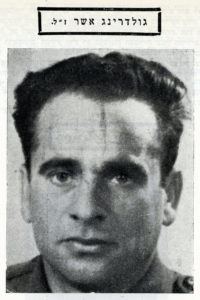
(Photo from The Book of the Jewish Brigade, p. 253)
Uszer Goldring (אשר גולדרינג) PAL/16323
(See also this…)
נעדר בליל יז’ בניסן תש”ה, 31 במארס 1945
משמר בן 12 חיילים מפלוגתו (פלוגה א’ גדוד א’), בפיקוד הסרג’נט לייזר ז”ל, התקיף באותו ערב בית-עמדה אחד בשם “דמפסי” על-יד פוגאנאנא בעמק הסנין. מטר-אש קטלני מ”שמייסר” ומספר גדול של רימוני-יד ניתכו עליהם ממרחק קטן, ואחד הרימונים פגע בלייזר. הוא צעק: “נפצעתי, הגישו עזרה ראשונה”. וגולדרינג הושיטה לו מיד. לייזר פקד לסגת וממלא מקומו מילא את פקודתו. אך גולדרינג לא רצה להיפרד מלייזר ועמד לעורתו עד הרגע האחרון. דבר זה נתגלה בשעה שהמשמר נתרחק מן הבית בתשעים מטר. החיילים לחזור ולהביאם, אבל מחמת ריבוי הפצועים לא היו מוכשרים להליכה וחזרו לעמדתם. כעבור זמן-מה יצא משמר לוחם בן 15 אנשים בפיקודו של קצין לחפש את שני הנעדרים ולהביאם אתם. אבל אלה תעו בדרך והיו מוכרחים לחזור. עם אור הבוקר הוציאו נושאי אלונקות את לייזר מת, ואילו גולדרינג לא נמצא ועקבותיו לא נודעו עד היום. אולי בידי הגרמנים והם לקחוהר אתם? אנו קיווינו שנשבה ונשאר בחיים, אבל עד עתה לא נתקבלה כל ידיעה עליו.
בן 31 אב לשני ילדים. לא היה חייב גיוס לפי צו המוסדות. אבל מצפונו הניעו להתנדב בין הראשונים. השקיע מרץ רב בעסקנות הצבורית שבין החיילים. חיוד תמיד בפניו, שקט בתנועותיו וקסם באישיותו. כשפגע פגז באנשי מחלקתו בתוך הקווים, הגיש הוא את העזרה הראשונה והרגיע את הפצועים. ביחוד הצטיין ביחסו החברי בשעת פעולות של פאטרול. אז כל חיוך וכל מלה טובה מרגיעים והוא היה איש ההומור העדין והאופי החזק כאחד.
__________
He was missing on the night of 17 Nissan [Saturday], March 31, 1945.
A 12-man guard from his company (Company A, 1st Battalion), under the command of the late Sergeant Leiser [Sgt. Shuli Leiser, PAL/17637], attacked a post office “Dempsey” that evening called near Fuganana in the Senin Valley. A deadly barrage of fire from “Schmeisers” [MP-40 submachine guns] and a large number of hand grenades were fired at them from a short distance, and one of the grenades hit Leiser. He shouted: “I’ve been injured; first aid.” And Goldring gave it to him at once. Leiser ordered a retreat and his deputy fulfilled his order. But Goldring did not want to part with Leiser and stood alongside him until the last minute. This was discovered as the guard moved ninety feet away from the house. The soldiers returned to fetch them, but due to the large number of wounded, they were not able to walk and returned to their position. Some time later, a 15-man combat guard under the command of an officer set out to search for the two missing and return with them. But they got lost along the way and had to go back. At dawn the stretcher-bearers removed the dead Leiser, while Goldring was not found and his traces are not known to this day. Maybe [he was] in the hands of the Germans and they took him with them? We had hoped him to have [him] been captured and left alive, but so far no information has been received about him.
A 31 year old father of two children. Did not have to be recruited by order of the institutions. But his conscience motivated him to be among the first to volunteer. He invested a great deal of energy in public activity among the soldiers. A sharpness always in his face; quiet in his movements and charm in his personality. When a shell hit members of his platoon inside the lines, he rendered first aid and reassured the wounded. He especially excelled in his friendly attitude during patrol operations. So his every smile and every good word was soothing and he was a man of gentle humor and strong character alike.
For further information and speculation about Uszer Goldring’s fate, see this.
____________________
Gorfein, Itzchak (יצחק גורפיין), Cpl., 17583
3rd Battalion
4/12/45
Ravenna War Cemetery, Piangipane, Ravenna, Italy – IV,D,3
Haaretz 5/15/45; Palestine Post 5/15/45; Lifshitz – 255-256; We Will Remember Them I – 96, 245
(CWGC as “Gorfain, Itzchak”; Palestine Post as “Gorfajn, I.”; We Will Remember Them as “Gorfein, I”)
____________________
Gustin, Yosef (יוסף (יוסקה) גוסטין גורטין), Cpl., 15149
1st Battalion
3/29/45
Ravenna War Cemetery, Piangipane, Ravenna, Italy – IV,B,2
Haaretz 4/13/45; Palestine Post 4/13/45; Lifshitz – 254-255; We Will Remember Them – 98, 245
(Palestine Post as “Gustin, Y.”)

(Photo via FindAGrave contributor Zvi Ben Moshe)
Yosef Gustin (יוסף (יוסקה) גוסטין גורטין) PAL/15149
(See also this…)
____________________
Herschkovits / Hershkovitz, Eliyahu (אליהו הרשקוביץ), Company Sergeant Major (WO 2C), PAL/38333
Military Medal for Awarded for “Extreme determination and courage in ousting the enemy from a succession of positions on Mount Ghabbeo feature on April 11, 1945.”
4/24/45 (mine explosion in front lines)
Born Ekron, Israel, 1911
Lived at Givat Brenner, Israel
Ravenna War Cemetery, Piangipane, Ravenna, Italy – IV,D,7
Al Ha-Mishmar 5/20/45; Davar 5/21/45; HaMashkif 5/20/45; Jewish Chronicle 5/11/45, 6/2/45; Palestine Post 6/13/46; Lifshitz – 257-258; We Will Remember Them I – 102, 246; We Will Remember Them II – 80

(Photo via FindAGrave contributor Zvi Ben Moshe)
Eliyahu Hershkovits / Hershkovitz (אליהו הרשקוביץ) PAL/38333
(See also this…)
____________________
Hirshfeld, Tzvi (צבי הירשפלד), Pvt., 17140
3rd Battalion
4/23/45
Ravenna War Cemetery, Piangipane, Ravenna, Italy – IV,D,6
Lifshitz – 259; We Will Remember Them I – 104, 246
(CWGC as “Hirschfeld, H.”; We Will Remember Them as “Hirshfeld, Tzvi”)
Kahn, J. (יוסף כהן), Cpl., 16706
1st Battalion
Died of wounds 4/7/45
Ravenna War Cemetery, Piangipane, Ravenna, Italy – IV,C,5
Haaretz 5/4/45; Palestine Post 5/6/45; Lifshitz – 271-272; We Will Remember Them I – 110
(Palestine Post as “Kahn, J.”)
Kalter, Zalman (זלמן קלטר), Pvt., PAL/38462
3rd Battalion
3/20/45
Coriano Ridge War Cemetery, Riccione, Italy – III,G,10
Haaretz 4/1/45, 4/5/45; Palestine Post 4/2/45; Lifshitz – 293; We Will Remember Them I – 247
(Palestine Post as “Kaltair, Zalman”)
____________________
Koslovitz / Kozlowicz, Mattathiahu (מתתיהו קוזלוביץ), Cpl., PAL/17467
1st Battalion
Wounded 4/12/45 during crossing of Senio River; Died of wounds 5/22/45
Caserta War Cemetery, Italy – V,B,14
Haaretz 5/15/45; Palestine Post 5/15/45; Lifshitz – 292; We Will Remember Them I – 249
(CWGC as “Kozlowicz, M.”; We Will Remember Them as “Koslovitz, Mattathiahu”)
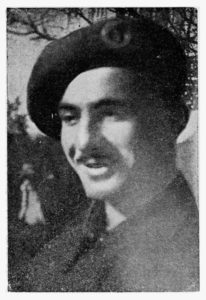
(Photo from The Book of the Jewish Brigade, p. 292)
Mattathiahu Koslovitz / Kozlowicz (מתתיהו קוזלוביץ) PAL/17467
(See also this…)

Died on 6th of Sivan 22.5.1945
He was hit in the chest by a shell as his regiment (the First Regiment) passed the Senio River. His wound seemed slight: he was moved from one military hospital to another, recovered, and managed to walk. But when he underwent surgery on 22.5.1945, he died suddenly during the operation.
He came to Israel as a child. He went to elementary school and later to the “Max Fine” professional school and was also occupied in youth jobs. He enlisted into the No. 20 infantry unit and like thousands of his comrades, tolerated inaction and guard duty. When the Jewish Brigade was formed, and especially during the training period in Fuji [sic] he was happy and proud of himself. He would say: “we have a real army”. He was promoted to the rank of Corporal at the front line for his dedication and diligence.
Even as a child he was diligent and loved working, and was also loyal and dedicated to his friends and ideals. He was loved by his friends in his platoon for his kindness, good spirit, cheerfulness, friendly attitude and willingness to help. At the front line he demonstrated courage and willingness to do any job. In the many letters he sent to his friends from the hospitals he was in, he expressed his desire to go back to the front lines.
____________________
Kurtzrock, Chaim (חיים קורצרוק), Cpl., 17526
1st Battalion
3/29/45
Born 1914
Arrived in Eretz Israel in 1933; enlisted 1942
Ravenna War Cemetery, Piangipane, Ravenna, Italy – IV,A,7
Haaretz 4/13/45; Palestine Post 4/13/45; Jewish Chronicle 5/11/45; Lifshitz – 294; We Will Remember Them I – 114, 249
(CWGC as “Kurzrock, Chaim Heinrich”; Palestine Post as “Kurzrock, C.”; We Will Remember Them as “Kurtzrock, Chaim”)
____________________
Leizer, Shuli (שולי לייזר), Sgt., 17637
1st Battalion
3/31/45
Ravenna War Cemetery, Piangipane, Ravenna, Italy – IV,A,8
Haaretz 4/27/45 (as “47637”); Palestine Post 4/27/45, 6/13/46; Lifshitz – 277-278; We Will Remember Them I – 118, 250
(CWGC as “Leiser, S.”; Palestine Post as “Leiser, S.”; We Will Remember Them as “Leizer, Shuli”)

(Photo from The Book of the Jewish Brigade, p. 277)
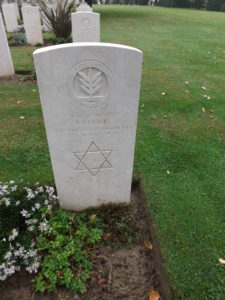
(Photo by FindAGrave researcher bbmir)
Shuli Leizer (שולי לייזר) PAL/17637
(See also this…)
____________________
Levy, Martin (מיכאל (מרטין) לוי), Sgt., 15160
1st Battalion
3/31/45
Ravenna War Cemetery, Piangipane, Ravenna, Italy – IV,B,4
Haaretz 4/13/45; Palestine Post 4/13/45; Lifshitz – 282-283; We Will Remember Them I – 120, 250
(CWGC as “Levy, M.”; Palestine Post as “Levy, M.”; We Will Remember Them as “Levy, Michael (Martin)”)
Lewin, Baruch (ברוך (בורקה) לוין), Pvt., 38067
1st Battalion
3/30/45
Born 1914
Mr. D. Levin (father), Tel Aviv, Israel
Student at Hebrew University; enlisted 1942
Ravenna War Cemetery, Piangipane, Ravenna, Italy – IV,B,6
Haaretz 4/13/45; Palestine Post 4/13/45; Jewish Chronicle 5/11/45; Lifshitz – 280-281; We Will Remember Them I – 122
(Palestine Post as “Levin, B.”)
Lieberman, Yoseph (יוסף ליברמן), Cpl., 38456
3rd Battalion
4/11/45
Born 1921
Ravenna War Cemetery, Piangipane, Ravenna, Italy – IV,C,7
Haaretz 5/15/45; Palestine Post 5/15/45; We Will Remember Them I – 122, 250
(CWGC as “Liberman, J.”; Palestine Post as “Liberman, J.”; We Will Remember Them as “Lieberman, Yoseph”)
Mandel, David (דוד מנדל), Pvt., 16641
3rd Battalion
4/12/45
Ravenna War Cemetery, Piangipane, Ravenna, Italy – IV,D,2
Haaretz 5/15/45; Palestine Post 5/15/45; Lifshitz – 284-285; We Will Remember Them I – 126, 251
(Palestine Post as “Mandel, D.”)
Mehlman, Moshe (משה מלמן), Sgt., 38412
3rd Battalion
Died of wounds 4/6/45
Ravenna War Cemetery, Piangipane, Ravenna, Italy – IV,C,4
Haaretz 5/4/45; Palestine Post 5/6/45; Lifshitz – 281-282; We Will Remember Them I – 130, 252
(CWGC as “Mehlman, M.”; Palestine Post as “Mehlman, N.”; We Will Remember Them as “Melman, Moshe”)
Rabinovitz, Tanchum (תנחום רבינוביץ), Pvt., 17351
3rd Battalion
3/21/45
Ravenna War Cemetery, Piangipane, Ravenna, Italy – IV,A,6
Haaretz 4/1/45, 4/5/45; Palestine Post 4/2/45; Lifshitz – 298; We Will Remember Them I – 142, 255
(CWGC as “Rabinowicz, Tanchum”; Palestine Post as “Rabinovitch, Tanhum”; We Will Remember Them as “Rabinovitz, Tanchum”)
Rizhi, Yitzchak (יצחק ריז’י), Sgt., 15142
1st Battalion
Died of wounds 3/29/45
Born 1910
From Ayelet Hashachar, Israel
Arrived in Eretz Israel from Poland in 1924; one of the founders of Hanita
Ravenna War Cemetery, Piangipane, Ravenna, Italy – IV,B,1
Haaretz 4/13/45; Palestine Post 4/13/45; Jewish Chronicle 5/11/45; Lifshitz – 296-297; We Will Remember Them I – 152, 255; We Will Remember Them II – NL
(CWGC as “Ryzy, Isaac”; Palestine Post as “Ryzy, I.”; We Will Remember Them as “Ryzy, Isaac” and “Rizhi, Yitzchak”)
Rusak, Zeev (זאב (וולף) רוסק), Pvt., 17757
3rd Battalion
3/19/45
Ravenna War Cemetery, Piangipane, Ravenna, Italy – IV,A,1
Haaretz 4/1/45, 4/5/45; Palestine Post 4/2/45; Lifshitz – 299; We Will Remember Them I – 152, 256
(CWGC as “Russak, Wolf”; Palestine Post as “Russak, Wolf”; We Will Remember Them as “Rusak, Zeev (Wolf)”)
Schleifstein, Asher (אשר שלייפשטיין), Pvt., PAL/15091
1st Battalion
4/7/45
Faenza War Cemetery, Faenza, Italy – VII,A,12
Haaretz 5/4/45; Palestine Post 5/6/45; Lifshitz – 303-304; We Will Remember Them I – 256
(CWGC as “Schleifstein, U.”; Palestine Post as “Schleinstein, U.”; We Will Remember Them as “Schleifstein, Asher”)
Schreer, Schlomo (שלמה שרייער), Pvt., 16727
1st Battalion
4/2/45
Ravenna War Cemetery, Piangipane, Ravenna, Italy – IV,C,2
Haaretz 4/27/45; Palestine Post 4/27/45; Lifshitz – 300-301; We Will Remember Them I – 156, 257
(CWGC as “Schreer, S.”; Palestine Post as “Schreer, S.”; We Will Remember Them as “Shrier (Shrir), Shlomo” and “Screer, S”)
Shechter, Aryeh (אריה (ליונה) שכטר), Pvt., 17225
1st Battalion
3/31/45
Kibbutz Shamir, Israel
Born 1920
Ravenna War Cemetery, Piangipane, Ravenna, Italy – IV,B,7
Haaretz 4/13/45; Palestine Post 4/13/45; Jewish Chronicle 5/11/45; Lifshitz – 306-307; We Will Remember Them I – 158
(Palestine Post as “Shechter, A.”)
____________________
Shiefer, Moshe (משה שיפר), Pvt., 38478
3rd Battalion
4/6/45
Ravenna War Cemetery, Piangipane, Ravenna, Italy – Collective Grave IV,D,5
Haaretz 5/4/45, 5/15/45; Palestine Post 5/6/45 (Missing Believed Killed); Palestine Post 5/15/45; Lifshitz – 307-308; We Will Remember Them I – 258; We Will Remember Them II – Not Listed
(CWGC as “Schipper, M.”; Palestine Post as “Shipper, M.”; We Will Remember Them as “Shiefer, Moshe”)
Sima, Yitzchak (יצחק סימא), Pvt., 38081
3rd Battalion
4/6/45
Ravenna War Cemetery, Piangipane, Ravenna, Italy – Collective Grave IV,D,5
Haaretz 5/4/45, 5/15/45; Palestine Post 5/6/45 (Missing Believed Killed); Palestine Post 5/15/45; Lifshitz – 286-287; We Will Remember Them I – 258
(Palestine Post as “Sima, I.”)

The collective grave of Privates Moshe Shiefer, Yitzhak Sima, and Moshe Ernest Wadel, and, Lieutenant David Anthony Van Gelder, from The Book of the Jewish Brigade (p. 262). According to biographies of the four men at The Commemoration Site of Fallen Defense and Security Forces of Israel, they were killed when their “improved position”, on the bank of the Senio River, was bombed (?) by the Germans and set on fire.
__________

As can be seen in this image from FindAGrave, Moshe and Yitzhak are buried together… (Photo by FindAGrave researcher bbmir)
Moshe Shiefer (משה שיפר) 38478
(See also this…)
…and…
Yitzhak Sima (יצחק סימא) 38081
(See also this…)
____________________
Van Gelder, David Anthony (דוד-אנטוני ואן-גלדר), Lieutenant, 293265
The Buffs (Royal East Kent Regiment)
4/6/45
Born 1924
Mr. and Mrs. Maurice Leonard and Rebecca Van Gelder (parents), Caterham, Surrey, England
242 Finchley Road, London, NW3, England
Ravenna War Cemetery, Piangipane, Ravenna, Italy – Collective Grave IV,D,5
The Jewish Chronicle 5/4/45; Lifshitz –263-264; We Will Remember Them I – 170, 260
(We Will Remember Them as “Van-Gelder, David A”; CWGC as “Van Gelder, Anthony David”. Not listed as member of Palestine Regiment or Jewish Brigade, but in Lifschitz’s book.)
Wadel, Moshe Ernest (משה-ארנסט ואדל), Pvt., 38479
3rd Battalion
4/6/45
Ravenna War Cemetery, Piangipane, Ravenna, Italy – Collective Grave IV,D,5
Haaretz 5/4/45; Palestine Post 5/6/45 (Missing Believed Killed); Palestine Post 5/15/45; Lifshitz – 261; We Will Remember Them I – 172, 261; FindAGrave
(CWGC as “Wadel, Moshe”; Palestine Post as “Wadel, I.”; We Will Remember Them as “Wadel, M.” and “Wedel, Moshe”)
_____

…while David Anthony and Moshe Ernest share the same resting place. (Photo by FindAGrave researcher bbmir)
David Anthony Van Gelder (דוד-אנטוני ואן-גלדר) 293265
(See also this…)
…and…
Moshe Ernest Wadel (משה-ארנסט ואדל) 38479
(See also this…)
____________________
Sulgaser, T.Y. (יעקב שולגסר), Pvt., 17809
3rd Battalion
3/20/45
Ravenna War Cemetery, Piangipane, Ravenna, Italy – IV,A,4
Haaretz 4/1/45, 4/5/45; Palestine Post 4/2/45; Lifshitz – 304-305; We Will Remember Them I – 168
(Palestine Post as “Sulgash, Jacob”)
Sznejer, J.C.H. (יוסף-חיים שניאור), Cpl., 16789
1st Battalion
3/31/45
Ravenna War Cemetery, Piangipane, Ravenna, Italy – IV,B,8
Haaretz 4/27/45; Palestine Post 4/27/45; Lifshitz – 301-302; We Will Remember Them I – 168
(CWGC as “Sznejer, J.C.H.”; Palestine Post as “Sznejer, J.”; We Will Remember Them as “Sznejer, J.C.H.”)
Tankelis, Zelig (זליג טנקל), Pvt., 16160
2nd Battalion
Died of wounds 4/13/45
Ravenna War Cemetery, Piangipane, Ravenna, Italy – IV,D,4
Haaretz 5/15/45; Palestine Post 5/15/45; Lifshitz – 269-270; We Will Remember Them I – 168, 259
(CWGC as “Tankelis, Z.”; Palestine Post as “Tankelis, Z.”; We Will Remember Them as “Tenkel, Zelig”)
____________________
Weksler, Eliyahu (אליהו וקסלר), Cpl., 38621
3rd Battalion
4/11/45
Ravenna War Cemetery, Piangipane, Ravenna, Italy – IV,D,1
Haaretz 5/15/45; Palestine Post 5/15/45; Lifshitz – 264-265; We Will Remember Them I – 174, 261
(CWGC gives name as “Weksler, E.”; Palestine Post as “Weksler, E.”; We Will Remember Them gives name as “Weksler, E.” (p. 174) and “Wechsler, Eliyahu” (p. 261))
Wieshbinski, M. (מיכאל ויז’בייסקי איזביצקי), Pvt., 17427
1st Battalion
3/29/45
Ravenna War Cemetery, Piangipane, Ravenna, Italy – IV,B,3
Haaretz 4/13/45; Palestine Post 4/13/45; Lifshitz – 243-244; We Will Remember Them I – 174
(Palestine Post as “Wieshbinski, M.”)
Yaacoby, Nachum (מנחם יעקבי ברגר), Pvt., 14103
1st Battalion
Died of wounds 3/30/45
Ravenna War Cemetery, Piangipane, Ravenna, Italy – IV,B,5
Haaretz 4/13/45; Palestine Post 4/13/45; Lifshitz – 272; We Will Remember Them I – 106, 262
(CWGC as “Jaacovi, Nachum”; Palestine Post as “Yaacovi, N.”; We Will Remember Them as “Yaacoby, Nachum”)
____________________
Zilberberg, Moshek Josif (משה זילברברג), Pvt., PAL/15435, Stretcher-Bearer, Military Medal
2nd Battalion
3/20/45 (“…he was shot dead by a sniper as he went into no-man’s land with a Red Cross flag in his hand to bring back a wounded man.”)
Ravenna War Cemetery, Piangipane, Ravenna, Italy – IV,A,2
Haaretz 4/1/45, 4/5/45, 4/13/45, 6/13/46; Palestine Post 4/2/45; Lifshitz – 266-267; We Will Remember Them I – 178, 263
(Palestine Post as “Silberberg, Moshe”)
_____

(Photo from The Book of the Jewish Brigade, p. 266)

(Photo by FindAGrave researcher bbmir)
Moshek Josif Zilberberg (משה זילברברג) PAL/15435
(See also this…)
נפל ביום ו’ בניסן תש”ה, 20 במארס 1945
Friday, April 20, 1945 / Yom Shishi, 7th Iyar, 5705
ביום 19 במארס 1945, ה’ בניסן תש”ה ערכה פלוגתו (פלוגה ג’ של הגדוד השני) התקפה גלויה על האויב במטרה להגיע עד התעלה, שמאחוריה נתבצרו הגרמנים. משה הוציא באלונקות את חבריו הפצועים משדה הקרב, פעם אחר פעם, מתוך סיכון-נפש תחת מטר כדורים והפצצות. עם תום המערכה נשאר מרצונו הטוב בשדה וחיכה לאחרוני השבים כדי להראות להם את המעבר הנוח והבטוח ביותר לשוב בו. באותו ערב אמר לחבר: ,,כנראה שאני מחוסן בפני כדירים, כי יצאתי היום שלם ממטר כדורים,,. המיגיור האנגלי, מפקד פלוגתו, הביע באותו ערב הערכה לאומץ-לבו של משה והמליץ להעניק לו אות-הצטיינות. למחרת היום, ב-20 במארס, כשחידשה פלוגתו את ההתקפה על האויב, חידש גם הוא את מעשי גבורתו ורץ גלוי לעיני האויב מפצוע לפצוע, כשדגל צלב האדום בידו. אחד החיילים נפצע ונאנק, ו על אף אזהרות חבריו שלא להסתכן, יצא להגיש לו עזרה. בו ברגע פגע בו כדור אויב והרגו במקום, ודגל הצלב האדום בידו. אחרי מותו נתכבד באות ההצטיינות הצבאי
נולד בשנת , עם פרוץ מלחמת-העולם הראשונה, בפלונסק שבפולניה להורים דתיים, קיבל חינוך דתי ולמד בישיבה, ויחד עם זה מעורה היה בתנועת-נוער ציונות מימי ילדותו. בגיל 18 היה בין מייסדי פלוגות ההכשרה בנאדבורנה (גליציה). בשנת 1935 עלה לארץ ועבד כפועל. כשפרצו המאורעות בארץ בשנת 1936 היה פעיל בשורות הבטחון. בשנים 1938-1939 עבד כנוטר. פעם בעמדו על משמרתו ביער להגן על אחת הנקודות עם עוד חבר מחברין, הותקפו על-ידי כנופיה ערבית והחבר נפל מת ומשה שנפצע קשה המשיך לירות עד שהדף את המתקיפים ואחר כך הרכיב את חברו על כתפיו והביאו אל המושבה. אותו פצע כמעט הטרידו מן העולם והרופאים אמרו נואש לחיין ,אך הוא חפץ חיים היה ובשארית כוחותיו נלחם במוות ויוכל לו. כאשר החלים ציינו כולם את הדבר כנס ופלא. לאחר שהבריא חזר לנוטרות. כשקמה תנועת הגיוס ל,,באפס,, התגייס ואמר לאשתו: ,,נולדתי בתקופת מלחמה ואני מוכרח להילחם,,. באוקטוכר 1944 עבר יחד עם גדודו לחי”ל.
ספר וחזן ונושא-אלונקות היה בחטיבה, ובכל המקצועות האלה נצטיין הן מבחינת הידיעה והן מבחינת המסירות. כספר היה חביב על כל החיילים והקצינים. בהיותו בעל קול ערב ומוכשר, היה עובר לפני התיבה כחזן קבוע בבית-הכנסת של הגדוד השני והיה מנעים את התפילות לפני קהל החיילים. כל אנשי הגדוד השני זטכרים לו לטוכה את התפילות, שעוך בימים הנוראים ובמועדיה לפי המנגינות המסורתיות. ביחוד נחקקה בזכרונם תפילת ,,כל נדרי,, בליל הכיפורים תש”ה במדבר המערבי בין בנגזי לדרנה תחת כיפת השמים, בשעת מסעם מתחותם הישנה אל-עבייר ליד בנגזי לבורג-אל-ערב, מקום רכוז החטיבה (לעיל פרק’ סעיף ב’). במשך שירותו בצבא שמר על קשרים עם המסורת ועם החיילים הדתיים. עם אירגונו של הגרעין הדתי להתישבות נצטרף אליו. כנושא-אלונקות בז היה לפגזי האויב וצעד בגלוי לחבוש פצועים נקובי-כדורים, זבידם ומחוסרי-הכרה, לחוקם ולעודדם. ולא חלילה מפני שמאס בחיים התנהג כך, להיפך, חפץ חיים היה, כאמור, אלא לנקום רצה מידי הגרמנום אם דם משפחתו ודם בית ישראל, שנשפך בפולנוה, כדכריו במכתבו לביתו מיום 10 במארס 1945: ,,ביד חזקה ובזרוע נטויה נלך קדימה עד נצחוננו הגמור על אויבינו,,. והיות והוא עצמו לא היה לוחם, רצה להציל לוחמום, שיוכלו הם להרוג ולהשמיד את צוררי היהודים, גם טוב-לבו הביאהו להקרבת עצמו.
לבו ניבא לו את מותו. בשעת ביקורו האחרון בביתו אמר לרעיתו: ,,הקריירה שלי כבר נגמרה,,. כן הביע את חרדתו לגורלו במכתביו האחרונים מקווי החזית. נזכרהו כאחד מבני-העם האלמונים והצנועים, שקידש במותו את גבורת ישראל.
__________
He fell on Friday, March 20, 1945
On March 19, 1945, the fifth of Nisan 5705, his company (Company C of the Second Battalion) made an open attack on the enemy in order to reach the canal (Fosso Vetro), behind which the Germans were fortified. Moshe retrieved his wounded comrades from the battlefield on stretchers, time and time again, under mental danger beneath a barrage of bullets and bombs. At the end of the campaign he remained of his own free will in the field and waited for the last of the returnees, to show them the easiest and safe passage to return. That evening he said to a friend: “Apparently I am vaccinated against bullets, because I remained out of the “rain” for a whole day.” The English major, the commander of his company, that evening expressed appreciation for Moshe’s courage and recommended that he be awarded the Medal of Excellence. The next day, on March 20, when his company resumed its attack on the enemy, he also resumed his heroic deeds and ran openly in front of the enemy from wounded to wounded, with the Red Cross flag in his hand. One of the soldiers was wounded and groaned, and despite warnings from his comrades not to take the risk, went out to help him. At that moment an enemy bullet hit him and killed on the spot, with the Red Cross flag in his hand. After his death we will be honored with the Medal of Merit [Military Medal; M.M.].
Born in the same year, with the outbreak of World War I, in Płońsk, Poland, to religious parents, he received a religious education and studied in a yeshiva, and at the same time he was involved in the Zionist youth movement from his childhood. At the age of 18 he was one of the founders of the training companies in Nadborna (Galicia). In 1935 he immigrated to Israel and worked as a laborer. When the events in the country broke out in 1936, he was active in the security ranks. In the years 1938-1939 he worked as a notary. Once standing on his guard in the woods to defend one of the points with another friend of theirs, they were attacked by an Arab gang and the friend fell dead, and Moshe who was badly wounded continued to shoot until he repelled the attackers and then mounted his friend on his shoulders and brought him to the colony. The same wound was almost took him from the world and the doctors said his life was desperate, but he wanted to live and with the rest of his strength he fought death. When he recovered, everyone mentioned the conversation with wonder. After recovering he returned to Notre Dame. When the recruitment movement for “Buffs” arose, he enlisted and said to his wife: “I was born in a time of war and I have to fight.” In October 1944, he moved with his battalion to the army.
Sefer and Hazan and a member of stretcher-bearers in the division, and in all these professions he would excel both in terms of knowledge and dedication. As a sefer he was a favorite of all the soldiers and officers. Having a deep voice and being talented, he would pass in front of the ark as a regular cantor in the synagogue of the Second Battalion and would recite the prayers in front of the soldiers. All the members of the second battalion remember the prayers for him, which are sung during the days of awe and times according to the traditional melodies. In particular, the prayer “Kol Nidre” was engraved in their memory on the night of Yom Kippur 5755 in the western desert between Benghazi and Darna in the open air, during their journey from their old stretch of al-Abiyar near Benghazi to Burg-al-Arab. During his service in the army he maintained ties with tradition and with religious soldiers. With the organization of the religious nucleus for settlement, he will join it. As the subject of stretcher-bearers he was to the enemy shells and openly marched to carry the bullet-ridden and unconscious wounded; to arm and encourage them. And, not God forbid, because he was tired of life behaving like this, on the contrary, Hefetz Chaim was, as mentioned, but seeking revenge from the Germans for the blood of his family and the blood of Beit Yisrael, spilled in Poland, as he wrote in his letter to his home dated March 10, 1945: “On our enemies …” And since he himself was not a warrior, he wanted to save warriors, so that they could kill and destroy the oppressors of the Jews; even his kindness led him to sacrifice himself.
His heart foretold his death. During his last visit to his home, he told his wife: “My career is over”. He also expressed his anxiety about his fate in his recent letters from the front lines. He is remembered as one of the anonymous and humble people who consecrated the heroism of Israel in his death.
________________________________________
____________________________________________________________
________________________________________
References
“Gelber 1984” – Gelber, Yoav, Jewish Palestinian Volunteering in the British Army During the Second World War – Volume IV – Jewish Volunteers in British Forces, World War II, Yav Izhak Ben-Zvi Publications, Jerusalem, Israel, 1984
Lifshitz, Jacob (יעקב, ליפשיץ), The Book of the Jewish Brigade: The History of the Jewish Brigade Fighting and Rescuing [in] the Diaspora (Sefer ha-Brigadah ha-Yehudit: ḳorot ha-ḥaṭivah ha-Yehudit ha-loḥemet ṿeha-matsilah et ha–golah ((גולהה קורות החטיבה היהודית הלוחמת והמצילה אתספר הבריגדה היהודית)), Shim’oni (שמעוני), Tel-Aviv, Israel, 1950
“We Will Remember Them I” – Morris, Henry, Edited by Gerald Smith, We Will Remember Them – A Record of the Jews Who Died in the Armed Forces of the Crown 1939 – 1945, Brassey’s, London, England, 1989
“We Will Remember Them II” – Morris, Henry, Edited by Hilary Halter, We Will Remember Them – A Record of the Jews Who Died in the Armed Forces of the Crown 1939 – 1945 – An Addendum, AJEX, London, England, 1994
Prisoners of War – Armies and Other Land Forces of The British Empire, 1939-1945 (“All Lists Corrected Generally Up to 30th March 1945), J.B. Hayward & Son, in Association with The Imperial War Museum Department of Printed Books, Polstead, Suffolk, England, 1990 (First published in 1945 by His Majesty’s Stationary Office)



